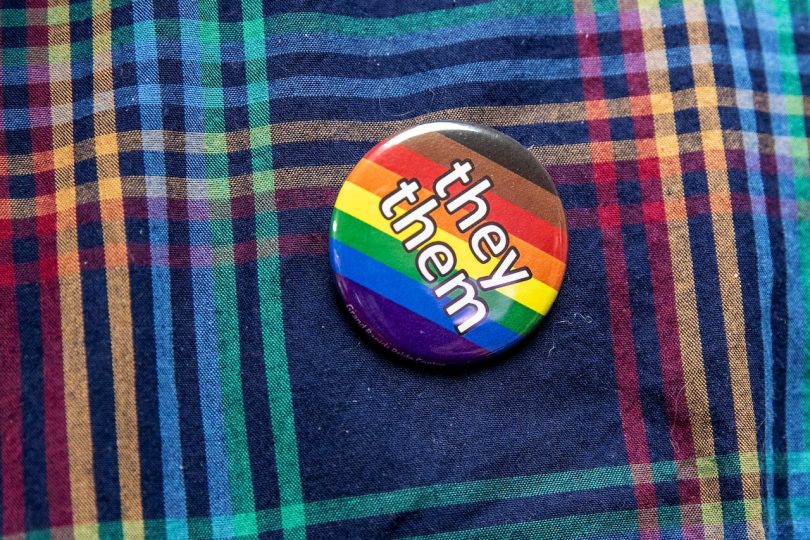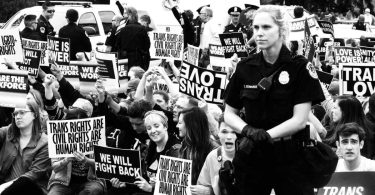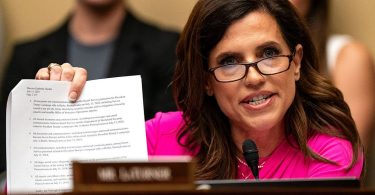For Cheryl Czach, the few short days since election night have felt like weeks.
The director of the Affirmations LGBTQ+ community center in Ferndale struggled to get through the immediate aftermath of Donald Trump’s victory without breaking down in tears.
She’s not alone.
After an election cycle dominated by attack ads demonizing transgender people, some LGBTQ+ Michiganders and advocates are gripped with anxiety over the election of a president who has vowed to target trans rights and roll back protections. They’re mobilizing in defense.
“I feel like our community is grieving, and with that there’s not only the deep sadness but also anger and shock and fear,” Czach said. At the same time, those feelings are crystalizing into a new resolve. “The fight is not over, and we’re not powerless. Our voices still matters.”
In the days since voters helped Trump burst through the “blue wall” in Michigan and other key battleground states, LGBTQ+ groups have held support gatherings and braced for an influx of volunteers.
At the same time nationally, calls to LGBTQ+ crisis hotlines have spiked.
Advocates told MLive they worry Trump’s victory could embolden violence and discrimination against the community, particularly trans youth.
“This is a painful and difficult moment for everyone who cherishes the freedom to be authentically yourself, for everyone in the LGBTQ+ community and for those who care about us,” said Erin Knott, executive director of Equality Michigan.
The concern takes root in Trump’s record during his first term, as well as ads that jammed the airwaves in recent months, stoking fears about trans women and girls in sports or taxpayer-funded gender transitions in prisons.
Many ran with the tagline “Kamala is for they/them. President Trump is for you.”
While LGBTQ+ groups cast doubt on the ads’ political effectiveness, Republicans leaned in, spending some $215 million on the messaging, according to one estimate.
The Trump campaign’s vilification of trans people, a tiny percentage of the American population, is going to “open the floodgates” for the use of slurs and other attacks on the community, said Bree Taylor, founder, president and executive director of Transgender Unity Coalition.
Read more: Anti-trans violence reached a record high last year. It hits home for some in Michigan.
“These are real lives, and there’s a real impact. And we get that pain,” said Taylor, who is transgender.
As trans people were “viciously and unfairly attacked” on the campaign trail, Czach said, she especially worries for young people internalizing anti-LGBTQ+ hatred.
The community has already been under fire in State Houses across the country, with one tally tracking 510 anti-LGBTQ+ bills introduced last year, including nine in Michigan.
Trump’s position on all LGBTQ+ Americans hasn’t been consistently hardline his time in public life — he backed an overhauled 2024 GOP platform that softened opposition to same-sex marriage, for example.
But his campaign this year cast trans people in particular as a threat, including in sports and schools.
His platform includes cutting funding for and punishing hospitals that offer gender-affirming care to minors and educators who discuss the topic with students.
A Trump administration would “promote positive education about the nuclear family, the roles of mothers and fathers, and celebrating rather than erasing the things that make men and women different and unique,” the platform reads.
And it would push for the U.S. government to recognize only two genders, male and female.
Civil liberties groups like the ACLU have said Trump policies could attempt to “erase transgender people from public life entirely” by criminalizing gender nonconformity and warned of broader efforts to eliminate anti-discrimination protections for LGBTQ+ people under a second Trump presidency.
In his first four years in the Oval Office, Trump’s administration wiped mention of the LGBTQ+ community from government websites, banned transgender people from openly serving in the military, sought to allow discrimination against LGBTQ+ people in adoption and foster care proceedings and supported allowing workplace discrimination against LGBTQ+ employees.
While some of the efforts were ultimately struck down in court, or reversed by the Biden Administration, they stand as bright red flags for some Michiganders.
“We already saw rights for people taken away, not just the gay community but especially the trans community, so we know what he’s capable of now, and that’s more frightening than ever,” said Ben Dowd, president of Lansing Pride.
Asked what another Trump residency would mean for LGBTQ+ Michiganders, a campaign spokesperson pointed toward the president’s gains across many areas of the electorate but offered no detail.
“From the beginning of this campaign, President Trump promised to be a president for all people,” said Team Trump Michigan Communications Director Victoria LaCivita in a statement. “His landslide victory is a result of the diverse and broad coalition he built by reaching out to Americans in every corner that felt ignored and silenced.”
In Michigan, there’s also cause for hope, some LGBTQ+ advocates said.
Unlike most states, Michigan has civil rights laws explicitly protecting LGBTQ+ people from discrimination in employment, housing, education and public accommodations, Knott said.
While federal judges may roll back protections, legal groups can use the state courts to challenge anti-LGBTQ+ discrimination, she said, and Michigan has a progressive majority on its Supreme Court, as well as an LGBTQ-friendly governor, attorney general and other top officials.
“We’re going to continue to be vocal advocates against LGBTQ+ hate,” Knott said.
Michigan already serves as an unofficial “sanctuary state” for families crossing the border from Ohio and Indiana because of laws there prohibiting gender-affirming medical care for youth, Czach said.
“I cannot tell you how many times in the last two days I’ve heard, ‘At least we live in Michigan.’ I think everyone feels that sentiment,” she said.
Taylor and the Transgender Unity Coalition are focused on disseminating practical information, particularly for time-sensitive government processes that could change under a new administration.
At events planned for Saturday, Nov. 9 in Southeast Michigan the group plans to offer guidance on steps like ensuring a U.S. passport doesn’t carry someone’s “deadname,” a term that transgender people use for a birth name that they no longer use.
“What we’re really seeing is something pretty new, pretty scary, so once that happens, we don’t really know what current safeguards at the federal level are going to remain in place,” Taylor said.
It also hopes to counter misinformation about the community. “We would like to expose the truth about how boring it is to be transgender,” she said.
Czach, Dowd and others told MLive that additional LGBTQ+ groups are opening their doors to community members who need mental health support, community or just a safe space to be.
That’s true even in hotbeds for LGBTQ+ history in the state, like Ann Arbor.
“Even in our little blue bubble, safe spaces are needed. Community is needed more than ever,” said Joe Halsch, president of the Jim Toy Community Center, named for the late Ann Arbor activist considered to be Michigan’s first out gay man.
Read more: Jim Toy Community Center returning to a physical location in Ann Arbor
The center’s phone doesn’t stop ringing, whether under Biden or Trump, Halsch said, with questions from parents trying to support children who are coming out and residents seeking advice on legal issues, housing or even where to get a haircut.
There’s still worry and uncertainty about what comes next, though.
“I think people are concerned about self-preservation,” Halsch said. “I think that’s kind of the overarching theme, whether it’s health care, whether it’s marital status, names, I think people are really concerned about self-preservation and what that looks like in this next political chapter.”
There are 24/7 resources available for the LGBTQ+ community, including the LGBT National Hotline at 888-843-4564 and crisis support from The Trevor Project available by visiting thetrevorproject.org/get-help, calling 1-866-488-7386 or texting “START” to 678-678.






